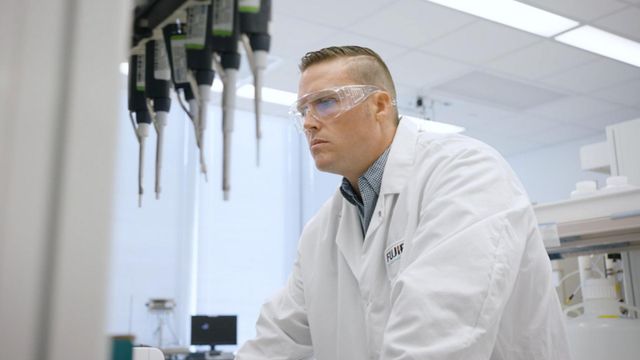The biopharma, clinical research and diagnostic ecosystem: how the intersecting industries are active in the Triangle
One of the largest and fastest-growing industries in the Triangle, life sciences and the fields that it includes are crucial in developing research with global impacts.
Posted — UpdatedAcross North Carolina, life sciences companies of all sizes are working on research with global impacts. In moving that research along, the help of contract research organizations, or CROs, is invaluable.
"North Carolina really shines in life sciences product development. You have everything you need for the full process — from early-stage research to preclinical testing and clinical trial management to clinical and commercial-scale manufacturing — to bring drug candidates through the regulatory approval process and to market," said Laura Rowley, Ph.D., director of life science economic development at NCBiotech. "Because North Carolina has such a unique and robust environment, we're seeing companies in each of these stages growing and expanding, including clinical research."
While the intersection between these companies is a boon to their success, what does it look like in practice?
It starts with a single research company that develops a promising product. It then gets to an inflection point when it makes the decision to carry out its preclinical research either in-house using its own resources and staff or by hiring another company to complete it.
In addition to providing technical expertise, life science companies partner with CROs to reduce potential conflicts of interest and increase confidence in the data for regulatory approval.
If they choose to work with a partner, the companies who signed on — many of which are clinical research organizations, or CROs — would receive the needed materials and develop and run the necessary assays. Then if the data indicates that the drug candidate exhibits the desired effect and is reasonably safe, this data is used to apply for the required regulatory approvals to begin clinical trials. The clinical phase would involve additional companies that could aid in designing the study, finding participants and making sure the trials meet the proper requirements for full regulatory approval.
Companies focused on diagnostic testing play a key role in providing data during the clinical trial process and once a drug is approved, informing physicians in developing treatment plans and determining when and what to prescribe their patients. If the product makes it to that point, the commercial manufacturing phase would begin.
"Generally, you can think of pharma companies as the clients of the CROs," said Rowley. "The research, assay development and testing performed by CROs is on behalf of their clients."
Training for clinical research jobs is readily available, allowing people like Liz Odera to transition between seemingly different companies.
Throughout her career, Odera has had experience in both the biopharma and CRO spheres — not to mention psychology and sports training, too. Odera has worked roles including an assistant research scientist at Bayer Crop Science, an associate scientist at BASF and a senior clinical trials administrator at Covance.
Currently, Odera is a project manager at Labcorp Drug Development, where she has firsthand experience with the intersection of CROs and biopharma. Since the industry is growing so quickly, there's plenty of opportunity for job seekers.
"If there's anything that's booming right now, it's biotech and biomanufacturing. They're looking for people to do the testing, to do the manufacturing, to do the processing — they're looking for people who think outside of the box. In some cases, you don't even need to have background training, because new employees in these jobs attend training anyway," said Odera. "That's the beautiful thing for those who are looking to get into biotechnology, biomanufacturing and clinical research. You can be a graduate of English and still become a clinical researcher."
For Odera, the readily available training in the area has been crucial in her career. As the biopharma and CRO industries continue to grow in the Triangle, she hopes to see interest in training opportunities grow as well in order to support and prepare the workforce.
Since biopharma and CROs work closely together, the training and experience offered by local institutions can help job seekers figure out which field is right for them.
"If you like to talk to people and work with people and you think you can make a future manager, go into clinical research. Even if you're working some other job, start going to some evening classes at some of those tech schools and community colleges and take advantage of financial aid," said Odera. "You can attend evening classes, you can get an internship, and those certifications will get your foot in the door."
"We have to take advantage of this training and resources," she said.
• Credits
Copyright 2024 by Capitol Broadcasting Company. All rights reserved. This material may not be published, broadcast, rewritten or redistributed.






